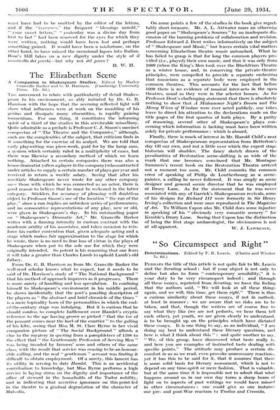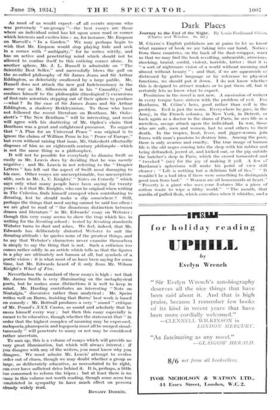" So Circumspect and Right
PERHAPS the title of this article is not quite fair to Mr. Leavis and the Scrutiny school : but if your object is not only to define but also to form contemporary sensibility," it is your duty to be very circumspect indeed ; and through all these essays, reprinted from Scrutiny, we have the feeling that the authors said, We will look at all these things again, and we will, this time, get them right." There is thus a curious similarity about these essays, if not in outlook, at least in manner : we are aware that no risks are to be taken, and that, though the writers are of course free to say what they like (we are not pedants, we hear them tell each other), yet youth, we are given clearly to understand, is to be brought up on the principles which have dictated these essays. It is one thing to say, as an individual, " I am doing my best to understand these literary questions, and here is what I think about this " : and quite another to say, " We, of this group, have discovered what taste really is, and here you see examples of instructed taste dealing with specific points." The attitude may produce a certain dis- comfort in us as we read, even provoke unnecessary reactions, yet it has this to be said for it, that it assumes that there is some solid basis for literary assessment, which is not to depend on any time-spirit or mere fashion. That is valuable, but at the same time it is impossible not to admit that what happens around us in our own day turns a sharp beam of light on to aspects of past writings we would have missed in other circumstances : one could give as one instance our pre- and post-War reaction to Troilus and Cressida. As most of us would expect—at all events anyone who was perversely " un-groupy "—the best essays are those where an individual mind has hit upon some road or corner which interests and excites him : as, for instance, Mr. Empson on Marvell's " In a Garden." We may perhaps begin to wish that Mr. Empson would stop playing hide and seek in a corner with " ambiguity," for he writes wittily, and has an active and penetrating mind which should not be allowed to confine itself to this enticing corner alone. In another sphere, Mr. J. L. Russell is admirable on " The Scientific Best Seller," and successfully blows the gaff on the so-called philosophy of Sir James Jeans and Sir Arthur Eddington, so delectably swallowed by a large public. Mr. Russell does not attack the new god Indeterminacy in the same way as Mr. Silberstein did in his " Causality," but confines himself to the philosophic (theological ?) excursions of first-rate scientists stepping out of their sphere to produce —what ? In the case of Sir James Jeans and Sir Arthur Eddington, a shadowy Berkleyanism. To those who have not followed the recent literature on Bentham, Mr. Oake- shott's " The New Bentham " will be interesting, and most will agree with his shattering of. Mr. Ogden's claim that Bentham was a great and enlightened precursor. To suggest that " A Plan for an Universal Peace " was original is to ignore the claims of William Penn in his " Peace of Europe," but even without raising that issue, Mr, .0akeshott effectually disposes of him as an eighteenth- century philosophe—which is not the same thing as a philosopher.
It will not be possible for everybody to dismiss Swift so easily as Mr. Leavis does by deciding that he was merely negative ; and Mr. Leavis in not referring to the " Drapier Letters " has left out the aspect of Swift most damaging to his case. Other essays are unexceptionable, too unexception- able, such as Mr. L. C. Knights' " Notes on Comedy " which says only what many people have been saying for twenty years : is it that Mr. Knights, who can be original when writing in The Criterion, finds himself cramped when contributing to Scrutiny, lest he should make a slip somewhere ? Still, perhaps the things that need saying cannot be said too often : we ate glad to read of " the disastrous distinction between drama and literature " in Mr. Edwards' essay on Webster : though this very essay seems to show the trap which lies in writing for the Scrutiny school : tested by Scrutiny standards Webster turns to dust and ashes. We feel, indeed, that Mr. Edwards has deliberately distorted Webster to suit the Scrutiny attitude : he quotes none of the greatest things, and to say that Webster's characters never examine themselves is simply to say the thing that is not. Such a criticism too comes rather oddly in an article which tells us that the figures in a play are ultimately not human at all, but symbols of a poetic vision : it is what most of us have been saying for some time, but Mr. Edwards heard of it only from Mr. Wilson Knight's Wheel of Fire.
Nevertheless the standard of these essays is high : not that Mr. James Smith is very illuminating on the metaphysical poets, but he makes some distinctions it is well to keep in mind. Mr. Harding contributes an interesting " Note on Nostalgia," discursive rather than analytical : Mr. Speirs writes well on Burns, insisting that Burns' best work is based on comedy : Mr. Bottrall produces a very " sound " critique of Mr. Pound's XXX Cantos, so sound and scholarly that he saves himself every way ; but then this essay especially is meant to be educative, though whether the statement that " in order that the highest complex of meaning may be expressed, melopoeia, phanopoeia and logopoeia must all be merged shnul- taneously " will penetrate to many or not may be considered rather uncertain.
To sum up, this is a volume of essays which will provide no very great illumination, but which will always interest : if you disagree with any of the writers, you must know why you disagree. We must admire Mr. Leavis' attempt to evolve order out of chaos, though we may doubt whether a group so large, so deliberately educative, so necessitated to be right, can ever have sufficient drive behind it. It is, perhaps, a little too concerned to reform the tripos ; but at least there is no essay in this volume not worth reading, though some seem too constricted in sympathy to have much effect on persons already widely read.
BONAMY DOBREE.





































 Previous page
Previous page